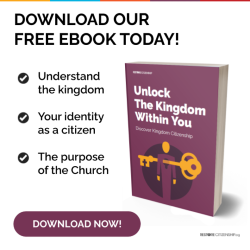Are you looking for a garden or a government? Not sure than read this article.
The New Testament sheds light on many things relating to the promises of God, these promises passed down through the ages from generation to generation stem from a long line of patriarchs who prefigured an aspect of the kingdom to come.
Read Hebrews 11:10: 'For he looked for a city which has foundations, whose builder and maker is God'
The great patriarch Abram whose constitution was changed to Abraham the father of nations is drawn upon in the book of Hebrews to describe the root from which many of these promises issued forth. The kingdom of God, the holy city, the throne of God and the King himself.
It is fitting that the writer of Hebrews points out the driving force which encompassed Abrahams life and provides context for all his failures and successes.
He sought a city…
Without this text we could assume that Abraham might have been paralysed by the promises given to him. In some instances his journey into maturity to become the father of a nation may have been stalled with his diversion to Egypt, the near loss of his wife to the Egyptian king and the birth of Ismael from his concubine Hagar. Surely the promises of God may not have come to pass had it not been the overriding goal to become a possessor of this city which had possessed him. Wherein his name was now written.
Hence though a righteous man fall he will always get up, because the city begins him to stand forthwith.
He looked for foundations…
Hebrews further eludes to what Abraham sought for and why he maintained a nomadic life. Not finding a theocratic form of government underpinned by the lord God, he understood that no matter the allure of prosperity and wealth which other city states promoted they would never fulfil the promises of God. It would be folly to believe that these economic systems could bring about the manifestation of such precious things given in the wilderness realised only by the continuing departure from all he had known to possess a far more superior economy.
In fact of his city state experiences, all they ultimately testified to were Gods mercy to deliver him from that which took away liberty with promises of freedom. The unfortunate legacy of Egypt being Ishmael, a man of war and strife.
Abraham’s reply to the king of Sodom also alludes to this when he states: he will not have another system testify to his wealth, of which he solely attributes to the economy of the Lords kingdom.
On the other side we find the patriarch Lot, a man to whom the promises were not given and yet journeying with Abraham would have understood the nature of the covenant his kin had with the Lord.
His defining moment comes as a lesson to us all. This lesson proved costly, the outcome being the loss of home, wife and children to the savage jaws of a city state in the throes of judgement, demolished by the righteousness of God.
The beginning of the account took place at the point where Abraham and Lot separated, at a high point marked by fruitfulness and multiplication, success comes to test us all, no less the patriarchs. It is within this context that the paths of the two men are determined by what they see. The first referencing the past, and the second the future. The first reminiscing of a garden and what has been lost, the second looking for a government and what must needs be possessed.
The lesson of these patriarchs serves us well for in the present day there is much around us today, which speaks of prosperity and freedom, and yet inwardly enslave and subject. Whilst citizens pursue promises of riches, serfdom is the order of the day.
Consider that what was described as a prosperous garden to Lot soon became a barren land smoking with ash. What promised freedom, ultimately took away sovereignty and liberty.
For today's believer, kingdom citizenship should BE the most precious commodity in which all promises are entailed. We must not sell out our election as Esau did for the culture of the present day, for our birthright speaks more than silver and gold and cost the life blood of our King.
Consider that it was Abraham’s pursuit of his citizenry that opened the doors for Lots intersession. Abraham a righteousness man in the eyes of his sovereign interceding for the righteousness of another bound in the city state of Sodom and Gomorrah. Lot a righteous man not having the assurance of a government, or the faithfulness of Sodom's sovereign to intercede with concerning the injustices which afflicted his soul from day to day. One citizen interceding for another in the midst of governmental conflict.
Unaware of the impending danger the message brought by the angels to Lot's house was 'Get out of Sodom, Get out of Gomorrah'. In the same tone the gospel of the kingdom issues forth today a message not to dissimilar to the Lords people 'Get out of Babylon'
The question is are we looking for a garden or government?
For King and for country...




